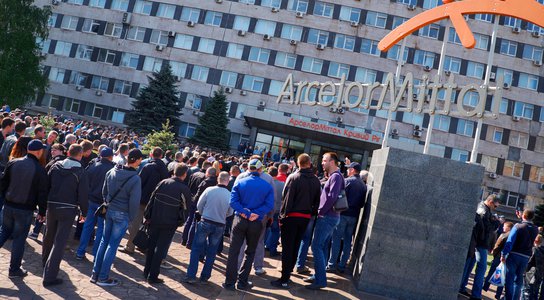On 31st January 2023, almost a year after Russia’s full-scale invasion, steel giant ArcelorMittal supported a forum of Ukrainian businesses and politicians who gathered to discuss the country’s reconstruction. A subsequent press release from the company, which is chaired and part-owned by one of Britain’s richest businessmen, Lakshmi Mittal, stated that it “reaffirms its commitment to its employees and the courageous people of Ukraine.”
The importance of Ukraine to ArcelorMittal, which owns the country’s largest steel plant and claims to be one of Kyiv’s largest taxpayers, was made evident in 2021 when Mittal met with President Volodymyr Zelenskyy to discuss investment in the country.
Yet Mittal, who finished sixth in The Sunday Times’ 2023 rich list, has businesses that appear to be funding both sides of the war.
Global Witness research reveals that since Russia invaded Ukraine until August 2023, HPCL-Mittal Energy Limited (HMEL), of which Mittal owns 49%, imported 7 million tonnes of Russian crude oil with an approximate value of over $3 billion.* In the first seven months of 2023 alone, these Russian oil imports were worth an estimated $788 million in direct tax revenues to the Kremlin** as it prosecutes its brutal war on Ukraine.
HMEL’s thirst for Russian crude
Located in the north Indian state of Punjab, HMEL owns a refinery that processes crude oil to make fuel products and petrochemicals like diesel and plastic.
Prior to the invasion of Ukraine, the refinery bought crude oil from an array of sources; a prospectus it released in 2019 stated that it signed supply contracts with countries including Saudi Arabia, Iraq, Mexico, and Kuwait.
However, Global Witness analysis of customs records and commodity tracking database Kpler shows that through the course of 2022, the diversity of HMEL’s oil sources dried up as the refinery sharply stepped up imports of Russian crude.
In 2022 HMEL imported five times more seaborne oil from Russia than it did in the preceding five years combined, even as the first tanker of the year did not arrive until May. Between January and July of last year when comparing with Indian government statistics, this research indicates that Russian oil accounted for about 62% of HMEL’s total crude feedstock.
In total, from the invasion of Ukraine through July 2023, the refinery imported 7 million tonnes of Russian oil. Using customs records, vessel tracking data, and benchmark oil prices from financial analytics platform Refinitiv, our analysis shows that the Russian oil cargoes had an estimated worth of over $3 billion.
To be clear, these purchases are legal - unlike Western nations, India has not sanctioned Russian oil. Yet as the Kremlin uses record amounts of Russia’s national budget to fund its brutal war, a significant portion of the money generated through HMEL’s Russian oil purchases will go directly to Moscow in the form of mineral extraction tax and export duty. The $788 million that the refinery’s transactions provided to the Russian state in the first seven months of last year are enough to buy over 450 of the Kalibr cruise missiles that have been used to kill scores of Ukrainian civilians.
Mittal on both sides
ArcelorMittal declined to comment on this research. It instead highlighted its humanitarian aid in Ukraine and its efforts to support its staff there.
But these revelations may make difficult reading for Mittal’s Ukrainian employees. While ArcelorMittal appears to be doing its best to support Ukraine, HMEL’s purchases have poured hundreds of millions into Russian state bank accounts.
They also pose awkward questions for the many public connections Mittal has to the UK. The billionaire, whose London residence is worth an estimated £171 million, made donations to both Boris Johnson, before he became prime minister, and the Labour party during Tony Blair’s tenure. He also partly owns English football club Queens Park Rangers (QPR), whose fans raised money for victims of the war as part of a Ukraine Day they hosted in March 2023.
While the UK government continues to send necessary aid to Ukraine, Mittal’s investments appear to be prospering. The company through which he owns the HMEL refinery received $54 million in dividends in the 2022-23 financial year alone.
Against these tens of millions of dollars, Mittal should consider the tens of thousands of refugees that have fled to the town that hosts ArcelorMittal’s steelworks in central Ukraine. Or the almost three thousand Ukrainian workers which ArcelorMittal says are involved in the country’s war effort. The company’s webpage is inundated with news of employees who have died on the frontline.
One tribute from a staff member to a colleague who was killed reads: “It is terrible that our people are dying, that the war is taking away the best, young people who could develop the enterprise, build the future of our country.”
HMEL, and Mittal Energy Investments, did not respond to Global Witness requests for comments on these findings.
* The value of the crude oil was calculated using Indian import customs data. Additional calculations were made using benchmark free on board (FOB) prices from Refinitiv that were based on date of shipment, volume, grade, and port derived from Kpler trade data.
** In Russia, the production and export of crude oil is mainly taxed through the Mineral Extraction Tax and Export Duty. How much the Kremlin collects on each exported barrel is difficult to determine due to a complex system of tax exemptions and subsidies. Our analysis assumes the lowest level of tax exemption. This figure was calculated using only crude imported in 2023 as complete data on tax rates for 2022 were not publicly available.


